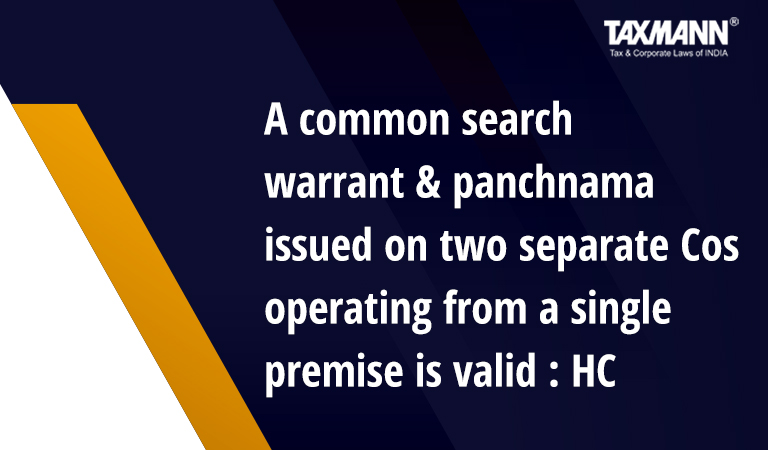A common search warrant & panchnama issued on two separate Cos operating from a single premise is valid : HC
- Blog|News|Income Tax|
- 3 Min Read
- By Taxmann
- |
- Last Updated on 6 December, 2021

Case Details: Shiva Cement Ltd. v. DIT (Inv.) - [2021] 132 taxmann.com 286 (Orissa)
Judiciary and Counsel Details
-
- Dr. S. Muralidhar, CJ. and B.P. Routray, J.
- Firoze Andhyarujina, Sr. Adv and L. Mishra, Adv. for the Petitioner.
- R.S. Chimanka Sr. Standing Counsel for the Respondent.
Facts of the Case
The assessees were two group entities engaged in different businesses but operating in same premises. During the year, a common search warrant was issued under section 132(1)(c) at their business and residential premises. Notices were issued under section 153A calling the assessees to file their return of income. Thereafter, a block assessment was made for the assessment years 1991-92 to 2000-01 wherein the Assessing Officer (AO) had determined undisclosed income of the assessees and levied tax on ground of suppression of income and non-filing of ITRs. Both the assessees filed writ petition contended that since they were two separate entities engaged in different businesses and filing separate returns, therefore, issuance of common search warrant and common panchnama upon them was impermissible in law.
High Court Held
The High Court held that there is nothing in either in section 132 or 133A that prohibits the department from surveying an entity exclusive to one location of its operations, whereas it may have credible information for search as regards the operations in another location.
As rightly pointed out by the department, search is qua a ‘place’ and not necessarily qua the ‘assessee’. The survey by its very nature could be of the entity and any place from where such entity may operate. It is perfectly possible that while conducting survey and seach of the premises of an entity, for which an authorisation has been issued, the department can come across material pertaining to some other person or entity. The provisions like section 153C deal with such contingencies.
However, that is not to say that a survey or a search cannot happen in two different premises simultaneously. Further, if the search is qua the place, the court sees no reason why if there are two entities in one premise, there cannot be a common search operation. Consequently, the plea of the petitioners that the search and survey operations were entirely without jurisdiction could not be accepted.
Thus, since warrant of authorization was qua ‘premises’ and not qua ‘assessee’, a common warrant of authorisation for search and common panchnama issued on assessees-group companies, operating from one premise, was justified.
Case Review
-
- Laljibhai Kanjibhai Mandalia v. Pr. DIT (Investigation ) [2019] 105 taxmann.com 260/263 Taxman 604/416 ITR 365 (Guj.) and,
- Madhu Gupta v. DIT (Inv.) [2013] 30 taxmann.com 92/214 Taxman 246/350 ITR 598 (Delhi) (para 33) followed.
- Ganga Prasad Maheshwari v. CIT [1981] 6 Taxman 363/[1983] 139 ITR 1043 (All.) (para 31.4) and
- Pr. CIT v. Param Dairy Ltd. [IT Appeal No. 37 of 2021, dated 15-2-2021] (Delhi) (para 32) distinguished.
List of Cases Referred to
-
- Laljibhai Kanjibhai Mandalia v. Pr. DIT (Investigation ) [2019] 105 taxmann.com 260/263 Taxman 604/416 ITR 365 (Guj.) and,
- Madhu Gupta v. DIT (Inv.) [2013] 30 taxmann.com 92/214 Taxman 246/350 ITR 598 (Delhi) (para 33) followed.
- Ganga Prasad Maheshwari v. CIT [1981] 6 Taxman 363/[1983] 139 ITR 1043 (All.) (para 31.4) and
- Pr. CIT v. Param Dairy Ltd. [IT Appeal No. 37 of 2021, dated 15-2-2021] (Delhi) (para 32) distinguished.
Disclaimer: The content/information published on the website is only for general information of the user and shall not be construed as legal advice. While the Taxmann has exercised reasonable efforts to ensure the veracity of information/content published, Taxmann shall be under no liability in any manner whatsoever for incorrect information, if any.

Taxmann Publications has a dedicated in-house Research & Editorial Team. This team consists of a team of Chartered Accountants, Company Secretaries, and Lawyers. This team works under the guidance and supervision of editor-in-chief Mr Rakesh Bhargava.
The Research and Editorial Team is responsible for developing reliable and accurate content for the readers. The team follows the six-sigma approach to achieve the benchmark of zero error in its publications and research platforms. The team ensures that the following publication guidelines are thoroughly followed while developing the content:
- The statutory material is obtained only from the authorized and reliable sources
- All the latest developments in the judicial and legislative fields are covered
- Prepare the analytical write-ups on current, controversial, and important issues to help the readers to understand the concept and its implications
- Every content published by Taxmann is complete, accurate and lucid
- All evidence-based statements are supported with proper reference to Section, Circular No., Notification No. or citations
- The golden rules of grammar, style and consistency are thoroughly followed
- Font and size that’s easy to read and remain consistent across all imprint and digital publications are applied



 CA | CS | CMA
CA | CS | CMA
